Best weather for ISIS
The text, photos and videos were prepared by JAMnews’s partner, the Ukrainian TV company Hromadske
In June 2014, ISIS militants occupied Mosul, the second largest city in the north-west of Iraq. On 16 October, 2016, the Iraqi military began to storm Mosul and the surrounding areas. In five months, they liberated most of the city. ISIS leader Abu Bakr Al Baghdadi admitted defeat and fled Mosul. A correspondent of Hromadske witnessed a confrontation between the Iraqi army and the ISIS militants.
One-storey Kurdistan
The journey to the center of the confrontation between the Iraqi army and ISS starts at the outskirts of Erbil, the capital of Iraqi Kurdistan. We were staying in the most inconspicuous hotel: there was no sign at the entrance, and the buildings were not higher than one floor. “This is the safest place in Erbil,” says Vera Mironova, a researcher at the Belfer Center for Science and International Relations at Harvard.
You can see the residence of Masud Barzani, the president of Kurdistan from the window of the hotel. The green hills with grazing flocks of sheep are around it.
“Hotels for foreigners, as a rule, are the highest buldings in the city and are located next to the administrative buildings,” explains Mironova. “ISIS puts snipers on the last floors of the hotels. This way, the militants get control of government facilities. In addition, near the places where foreigners live, militants arrange suicide attacks (cars with explosives, – ed).
Kurdish roadblocks start when leaving Erbil. The Kurds consider these territories historically their own, although the official border of Kurdistan ends before the point. Except to the Kurds, local volunteer battalions occupy some buildings. They are commonly called ‘Hashd’. These are paramilitary formations under the control of the Iraqi Ministry of Internal Affairs, consisting of Shiites, Sunnis and Christians. They were created in 2014 to fight ISIS.
Right here, at the entrances to Mosul, you can see the scale of the devastation caused by the war: houses with broken windows and riddled with shells, destroyed shops and gas stations. A typical picture is a parking lot with hundreds of burnt cars.
Western Mosul
Mosul is divided into two parts by the river Tigris. The old city with administrative buildings, a museum and one of the largest universities in Iraq all are located on the west side of the river. Today, the center of this part of Mosul remains under control of the militants. This is about 10% of the total territory.
The main bridges of the city were destroyed during the military operation. One must take a detour over temporary bridges in the western part of Mosul, where the fighting is ongoing.
Behind one of the bridges, in a private house formerly occupied by ISIS militants, is the base of the internal rapid reaction troops of the Iraqi Federal police.
On the steps at the entrance, there is a collection of shells. They are surrounded by local children – they learn how to distinguish the calibers.
“We carry them down here from the front lines,” a sapper explains.
The military man has a pink smartphone in his hands. The sapper remarks that nothing can be touched at the forefront: while retreating, ISIS leaves household things on the ground stuffed with explosives.
Couscous with meat, boiled eggs and pita bread – this is the military breakfast. After having it, the soldiers advance to the front line. They take us with them – to show their achievements, and, as it turns out, partially embellish them.
“You are offered to make a fake interview,” Azad, the interpreter tells us.
There is a former journalist in the unit who was wounded during the fighting. He now wears a uniform and appears to be military.
We met him a little bit later. A cane, sunglasses – fragments of an exploded mine have deprived the man of sight. He was celebrating his birthday. The military brought him a cake, sang ‘Happy Birthday to You’ and launched fireworks. The main gift to the man was made by journalists of the Kurdish television channel Rudaw, who gives them an interview as military.
The way to the war zone lies through the ruins of the airport. All buildings, terminals with lounges, that once hosted tourists and businesspersons, were destroyed by American aviation and ISIS mortars.
Today, the front line passes through the prosperous blocks of western Mosul. Automatic bursts and explosions are heard there and aviation nearby. Despite all this, some local people decided not to leave their homes.
A white sheet hangs in the wind above the gate of one of these houses. Three unmarried women live here in a spacious two-story building. The sisters, Asil and Zina are a little more than forty. Their aunt Zaida is twice as old.
After the arrival of ISIS in the city, women had to stop teaching. Today, they do not teach children and the schools of western Mosul are closed as there is still shooting around.
The sisters live on old savings. They say that they receive money neither from the Iraqi government, nor from the international organizations. Water and products are bought from the military.
We drank juice on the veranda and listened to the sound of mortar shell explosions fired by militants. Chairs bounced up from the shock waves. Polyethylene loudly rustled. It is inserted into the window frames here instead of glass. The women do not react to explosions, merely laugh when we shudder from the rumble.
“Once in winter, during the operation to liberate Mosul, ISIS militants broke into our home,” remembers Asil. “They asked to give them a car. They put explosives in them – this was one of the types of weapons used against the Iraqi army. I said: ‘I will not give you the car. If something happens, we will not be able to reach the hospital.’ They replied: “Then we will kill you. Are not you afraid?” I answered honestly: “I am afraid, but you will not get the car.” “How did it end?” Asil pours us juice, “They took a statement from us that we refused to cooperate with ISIS.”
“Even crueler,” Asil admits, “were the wives of militants:
We heard that they used to beat and bite women, if they went out on the street uncovered.”
“They did not respect us,” Zina says. “One day I went to a drugstore and did not take gloves with me. According to ISS rules, the open hands of a woman is haraam, that is, a sin. One of the militants saw this and promised to kill me.”
A mortar shell explodes somewhere nearby. We shudder once again. The women laugh again. We were wearing bulletproof vests. Asil, Zina and Zaida never had any special protective vests. The sisters spent two months without them under crossfire. They say now they do not need them any more.
“All is the will of Allah,” Zina smiles.
On the ground floor of the building next to the house of the sisters’ house stays military. On the second floor lives a young family: Ramzi Kazen, his wife Nur Fadel Shalan and two little children.
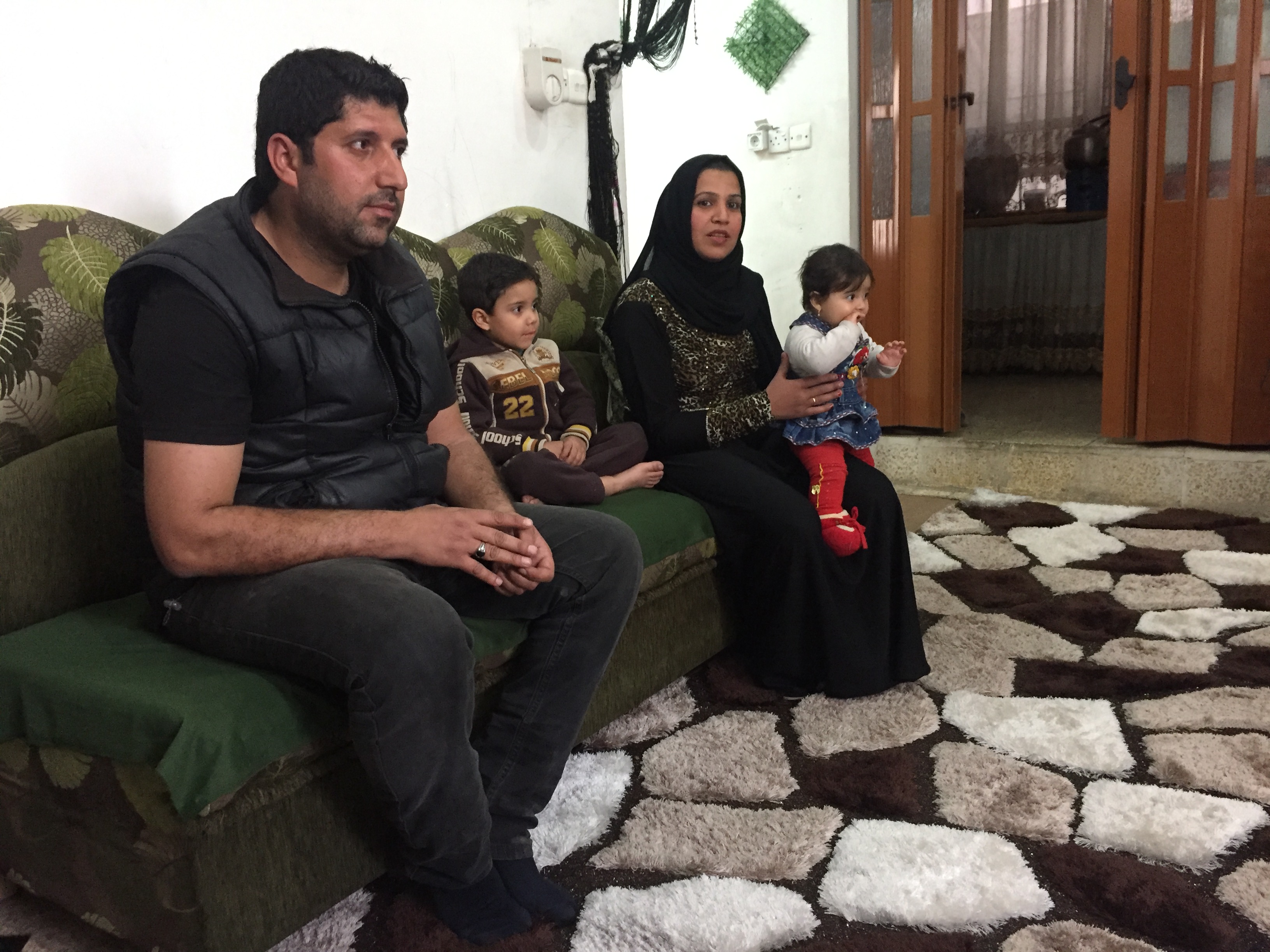
Before the war, Ramzi distributed chicken meat to Iraqi cities. In 2014, he opened a women’s clothing store in western Mosul. Within 10 days it was closed by militants. Today the family lives only at the expense of the help of the Iraqi army.
The youngest daughter of the Kasin family is nine months old. She was born at the time when the city was controlled by ISIS militants.
“We wanted to give her the name Mirna,” Ramzi says. “But ISIS was against it: they said that this is a Christian and a Jewish name. The militants demanded that the child should be given the name of Nab, in translation from Arabic – the message. This is the name of the weekly newspaper published by the Islamic State.”
“Our daughter was given an ISIS birth certificate,” Nur explains. “We want to change it to a normal one, but the Iraqi military say that it is not necessary yet. Like, this is the only document for the child, and it must be kept.”
In the maternity ward of the hospital, where Nur was, enough women supported militants. All of them, she recalls, gave their newborns the names of Shaheeds – the diseased emirs of the Islamic State.
Eastern Mosul
Narrow streets, here and there covered with scraps of barbed wire. Houses of marble color, burned and destroyed. Volunteer water distribution points. Endless checkpoints of the Iraqi army. Rare passers-by. A pair of hastily rehabilitated schools and small food stores. Eastern Mosul was released on 27 January, but so far it looks as if the battles there ended just a few days ago.
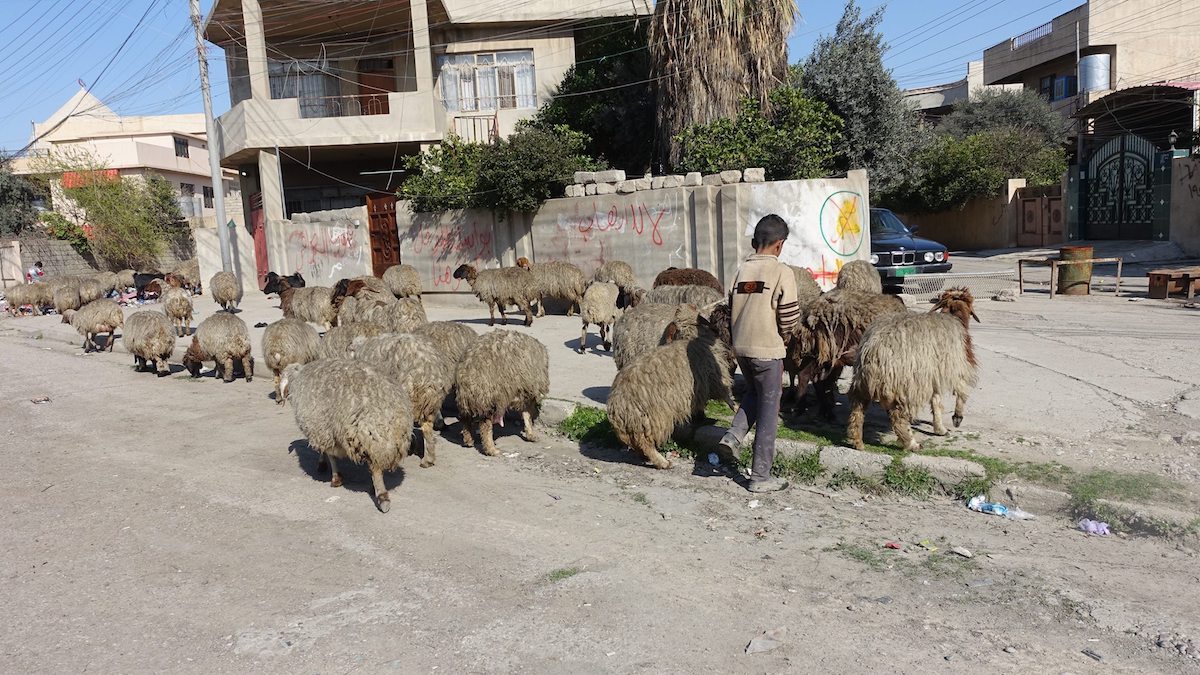
One of the districts of eastern Mosul is controlled by the self-defense unit of the Iraqi Ministry of Defense. The headquarters are located in a house in which militants used to make bombs for suicide cars. Commander Omar takes us in a small room. Instead of sofas, mattresses are laid out here in several layers, a mess of papers and photographs on the table. There are bottles of water, ashtrays and tea on stools. Every now and then, officers rush into the room and report something to Omar.
One of them shows a video taken by the militants. Several captive men are blown up in a car.
“The man on the video is my brother,” the soldier explains. “They just took him and blew him up.” That is against such people, that we are at war.
The motivation of volunteers is to fight against those who killed and raped their relatives, friends and acquaintances. For many, it is also a way to gain experience in fighting from those who were trained by Americans.
The vast majority of the Iraqi military are young men 20-30 years old. They remember the war in Iraq that began in 2003 and how their families suffering from the economic crisis that continues these days.
Volunteers are proud of their injuries. One of those who came to our room demonstrates his disfigurements: he can not move his ring finger on his right hand. The left arm could almost not bend at the elbow.
“With this hand, I killed an ISIS man,” the soldier proudly says.
Omar, his commander, admits that even though eastern Mosul is liberated, the danger has not passed yet. “A quarter of the current population of the territory” he explains, “are the settlers from the western part of the city and the destroyed eastern districts.”
“Many of those who moved here disguise themselves as the displaced, but in fact, they support ISIS,” Omar says. “There are also many wives of militants and their children.” “How do you deal with them?” I ask.
“No way. We stay in control, but not more than that. Well, what can we do?”
The unit conducts raids daily on quarters in search of the “sleeper cells”. These are tunnels under residential buildings, in which ISIS militants are still hiding.
The tunnels appeared in the times when ISIS entered the territory of Mosul. As a rule, they pass deep under houses and lead to exits to the streets, so in case of anything you can escape. In the house that the military of “self-defense” show us, the tunnel is dug in the courtyard. ISIS militants used it as a weapons warehouse as well. Next to the tunnel is a secret exit in the wall to the next courtyard. The Iraqi military, as a rule, leave the tunnels in the same condition in which they were found.
Another officer enters the room. He gives Omar some folders. The officer’s name is Ali. He asks not to be photographed. This is explained by the fact that he is too well known to ISIS. While the commander is studying the documents, he turns on the audio recording of the telephone conversation. According to Ali, an ISIS gunman reports that when the Islamic state returns to Mosul, all the soldiers of the Iraqi army will be “forgiven”. All of them, except Ali.
“I just killed too many ISIS men” the military man explains.
Ali believes that liberation of Mosul is not the final victory yet: the militants will return.
“Law enforcement agencies and courts are corrupt in Iraq,” the military says. “ISIS members are sent to prison – mainly in Baghdad and Nasiriyah. There, they are let out for money. Local militants cost 25 dollars. The price for emirs is 6 thousand. They go to jail and then, just “disappear”.”
The military names the figures: during the operation about 200 militants “evaporated” for bribes from prisons.
“So it is better to kill them right away,” concludes Ali.
City of the displaced
The next day we got to a large camp for the displaced in Hazer. It is located between Mosul and Irbil. Instead of houses there are spacious white tents. Each of these tents can accommodate a family of up to ten people. Nowadays they have become temporary dwellings for 200 thousand people.
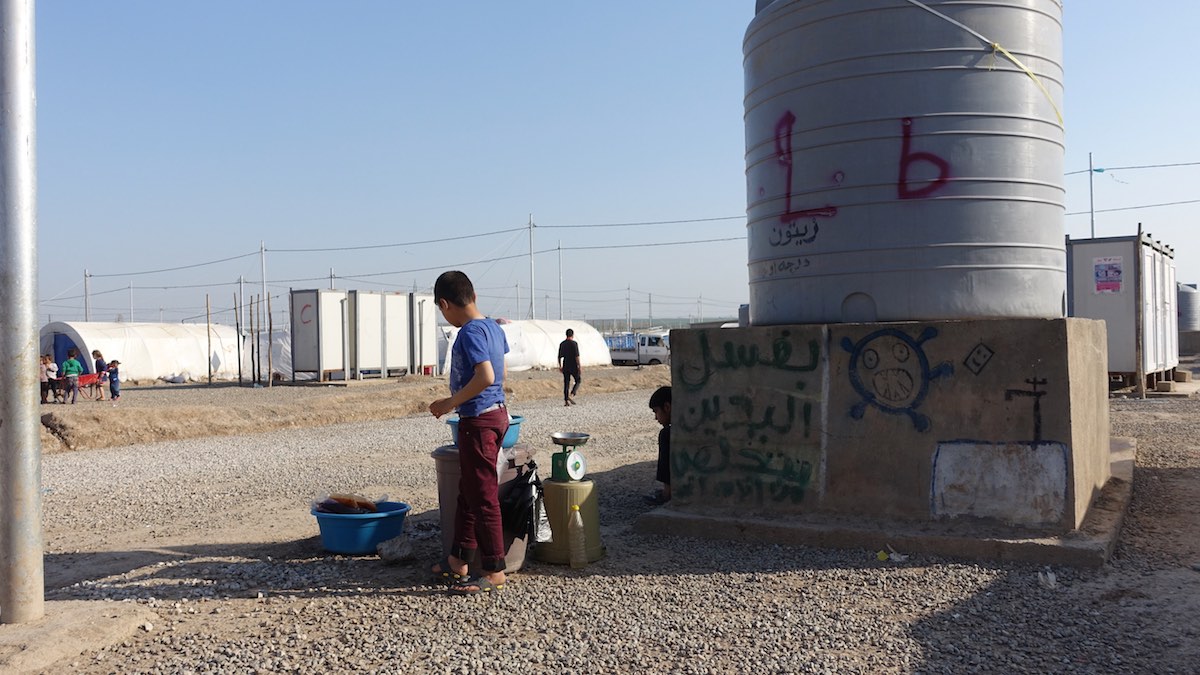
The camp is funded by several international humanitarian organizations – the Iraqi and Qatar “Red Cross”, USAID, UNICEF. They buy water, food and hygienic supplies for the displaced. The displaced are centrally sent here after they pass the “check on terrorism” in the filtration center in Mosul.
Most of them have lived here since the fall of 2016. They do not have the opportunity to return home – their homes have been destroyed and their financial situation does not permit them to move to any Iraqi city to start a new life.
- “We have lost everything,” Amir says. “I am in a terrible condition, to be honest. We do not receive any benefits from the state and cannot live normally.”
During the military operations in eastern Mosul, Amir lost her youngest child. Now she and her husband raise seven children.
The public life of the camp is concentrated around the concrete blocks, on which tanks with water are installed. Next to them, men discuss politics with cigarettes and tea and children play hide and seek.
The elderly Arab Mohammed, who lost one leg during the battle for eastern Mosul, calls everyone for tea.
The man takes a thousand dinars for four portions of drinks – approximately seventy cents.
We share our portions with Amurabi, a 26-year-old Muslim Shiite. In Mosul, where most of the inhabitants are Sunnis, he was considered a “black sheep” before the arrival of ISIS. And when the city was occupied by militants, his life was in jeopardy.
“ISIS reported that they will kill our family,” says Amuraby. “We had to become Sunni. I know that they cut off the heads of those who refused to do the same.”
Amurabi’s father was an Iraqi army officer under Saddam Hussein. The militants arrested him. But they did not kill him: they needed the military, who knew the weapons stored in military warehouses.
During the operation to liberate Mosul, Amurabi with his family was in the Christian village of Bartalla, which was controlled by ISIS that time. The Iraqi army repulsed the village in winter.
“ISOF (Iraqi special operations forces – ed) entered in Bartalla,” recalls Amurabi, “one of the military saw me, strucked me and cried: “Why do not you shave your beard? Are you for ISIS?” What could I answer? We had many days without food or water. I did not even think about razor blades.”
Laws against culture
We leave from the camp for the displaced with an armored ambulance car. Together with a group of Iraqi journalists we are taken to the forefront – to the museum of Mosul. The artifacts telling about the history of the Assyrian Empire were collected there. Mosul was one of the centers of the Empire at the end of the first millennium BC.
In 2014, Islamic State militants said that the museum sculptures violate Sharia law and propagate idolatry. They destroyed most of them, and then, the ruins of the ancient Mesopotamian city of Nimrud, south-east of Mosul.
“ISIS made a base from the museum. Explosives were stored here and they equipped the publishing center in the archives,” says Mehdi Weishan, the captain of the Federal police.



The rain was falling. The first explosions were heard a few minutes after it had started. The military explained: ISIS fired at the museum from mortars. It turns out that the Iraqi army controls only one side of the territory. Another part of the museum is still under control of the militants. For almost an hour, we are blocked in a shelled room.
We come back from the museum with losses: the car is riddled with shrapnel mines, one soldier is wounded.
Shells for rain
“If not for the heavy rains in Mosul, the city would most likely already have been liberated,” explains Vera Mironova. “Rain is ideal weather for ISIS.”
In five months, with the support of coalition forces, Iraq managed to liberate 90% of the city. But the most difficult thing is to put an end to it. The key role in the approach of victory is played by weather. Army drones, which target fighters, are powerless in the rain and in this kind of weather the militants begin mortar shelling without the fear of aviation. ‘ISIS weather’ – this is the way that rain is called in Mosul.
The best weather for ISIS is also suitable for internally displaced persons. The termination of air operations allows people living under fire to leave the destroyed houses and get to the camp. For many, this is the last chance not to die of hunger.
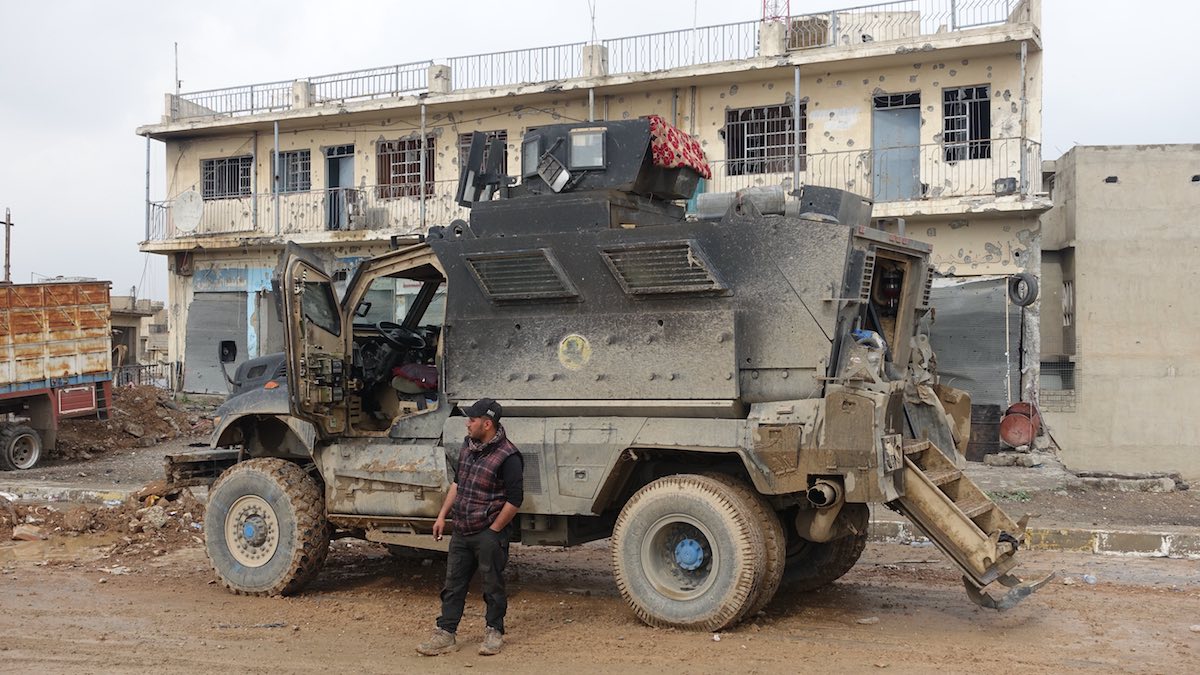
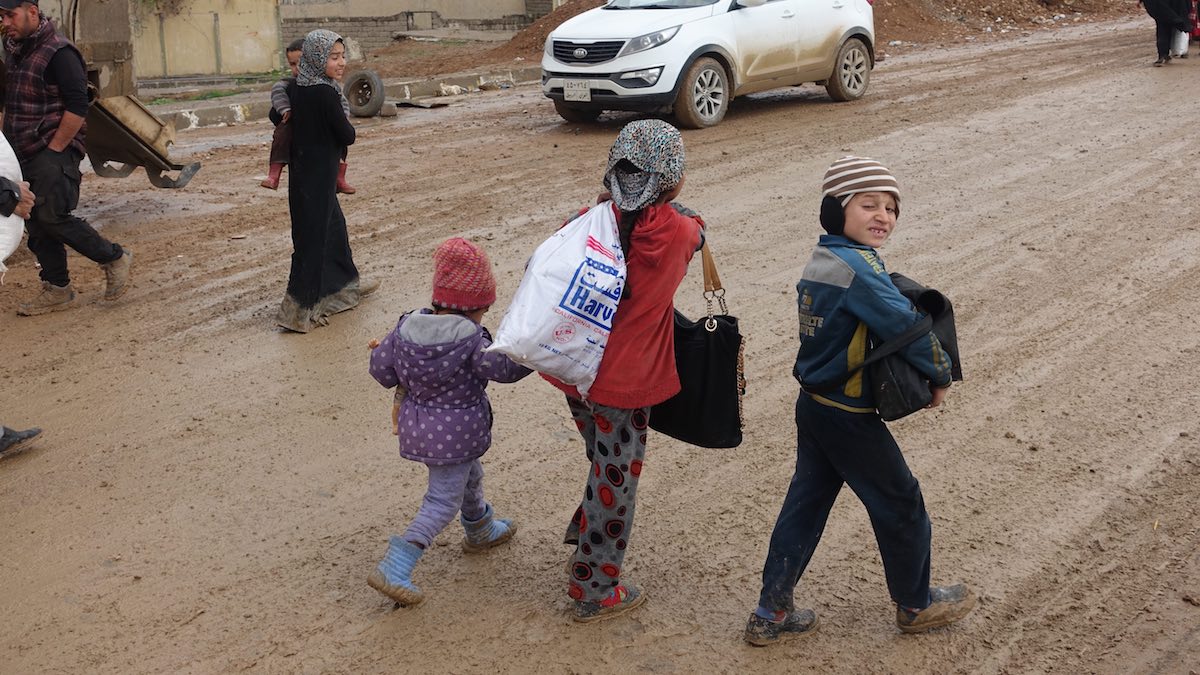
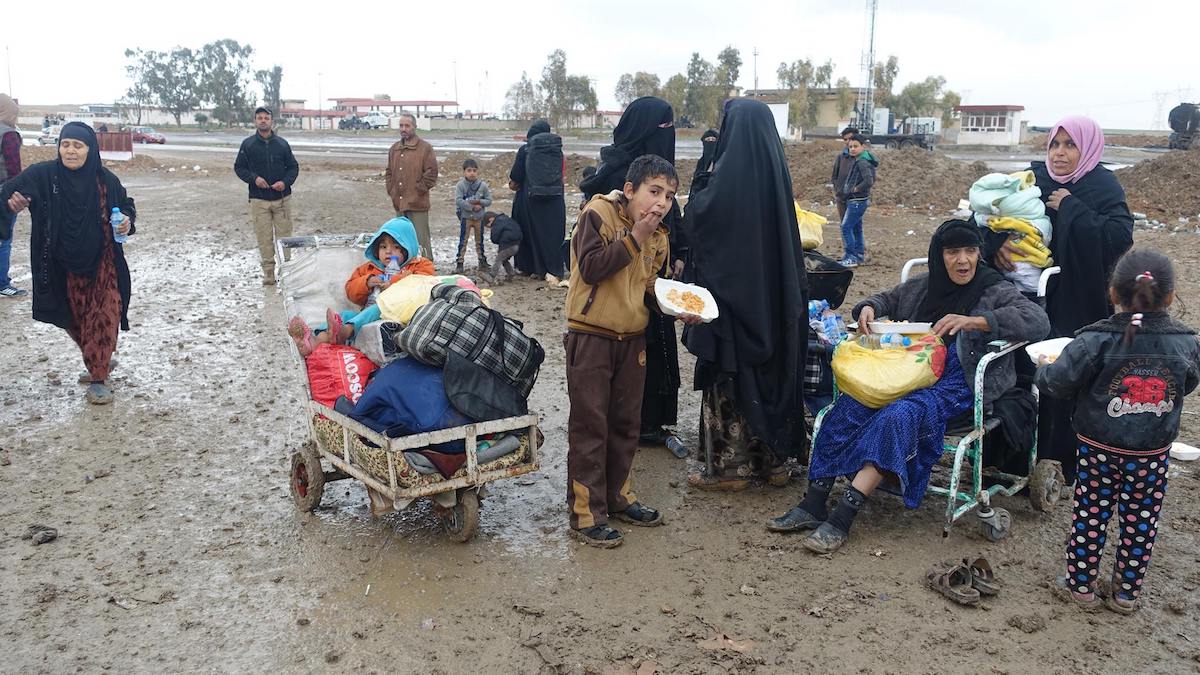
Local people are prohibited from leaving the city in the territories that remain under control of the Islamic State.
“ISIS announced that anyone who tries to escape will be shot by snipers,” the displaced tell. Some managed to get out through tunnels under the houses, but this is rather an exception.
In the pouring rain, people walk several kilometers to the Azba Sadzer station, which is located on the Mosul-Baghdad highway. This is the first transitional point for those who decided to flee the war. It is called “dirty”: the station is in the middle of a wasteland where there is no asphalt, no decking. Rain turns the earth into viscous slurry.
In bad weather, this conveyor practically does not stop: 2-3 thousand people get here every day.
The volunteers give each person a portion of rice with meat sauce, pita bread and water, and if necessary – medicines. Only after this, the displaced are checked in the electronic database. This process takes place in a small van, the walls of which are decorated with the logos of the largest international donor organizations.
The station employees identified two members of ISIS in our presence, as they said, who tried to leave Mosul under the guise of the displaced. Talking to journalists is prohibited. But the military conduct a detailed and – this is not customary to say – tough conversation with the detainees, with the use of force. After checking, the militants were escorted to prison.
The rain is over. We returned to western Mosul. Some cars rarely turn on the road from the streets of one of the destroyed neighborhoods. One of the drivers, seeing our camera, pulled out a gun.
“Take pictures, take!” He laughs and wags his weapon. A pair of military men patrolling the road does not pay any attention to him…



















